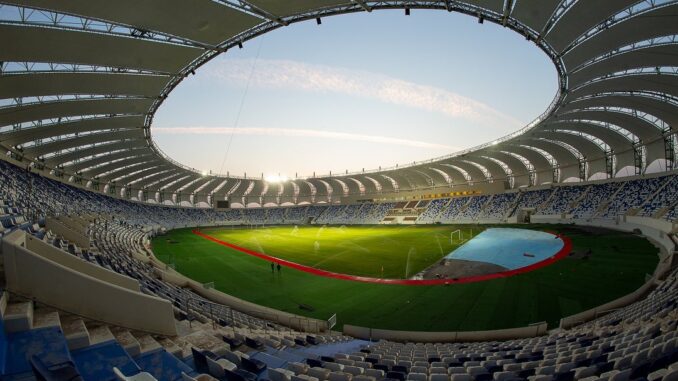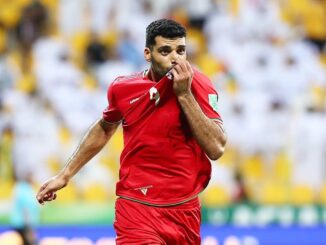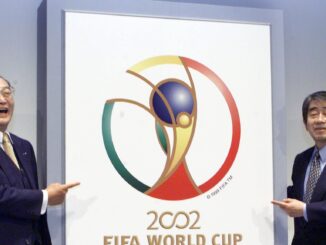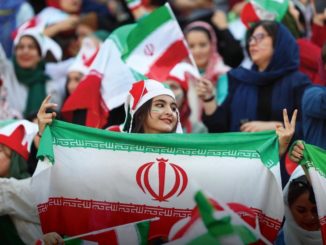
Having enjoyed the world’s attention towards the end of 2022, the Arab world pivots to a more regional outlook for the upcoming 25th edition of the Arabian Gulf Cup that greets the turn of the year.
While interest in the upcoming proceedings in Basra, Iraq this January may have been dwarfed by the exposure seen in Qatar just a month ago, or even the eagerly anticipated Al Nassr debut of Cristiano Ronaldo in the coming days, arguably the biggest and most significant regional tournament in Asian football provides some niche respite from the global glare.
As Asia’s penchant for regional tournaments wanes, as has been regularly discussed over the last couple of weeks at their South-East Asian sister tournament, the AFF Mitsubishi Electric Cup, the upcoming Arabian Gulf Cup also pits itself squarely at odds with domestic club football, the recently culminated World Cup and increasingly lofty ambitions that leave the tournament needing to lift some heavy load to bring the sort of engagement it used to command at the turn of the century.
It must be said, however, this tournament does have a reputation for rising like a phoenix out of the ashes of a messy start. Only days out from the opening fixture, similar mitigations feel symbolic to the Gulf Cup aura; stadium concerns, logistical mishaps, last minute squad changes and managerial switches are all typical of a tournament that rarely runs as predicted. Through the melee however, appears hosts Iraq, with plenty to live up to both on and off the field.
The hosts with a lot to prove
Two editions on from their relinquished hosting of the 23rd Arabian Gulf Cup, originally intended to be played in 2016, Iraq, in their footballing capital of Basra, are set to welcome guests from across the region for the quarter centurion edition of this historical trophy.
Like seven years ago, there has been doubt, as late as a fortnight ago, behind the scenes that this tournament would ever materialise in view of the newly opened Al-Minaa Olympic Stadium typically opening to minor farce and concern.
Roll on Friday for their opener against Oman in the Basra International Stadium, and Iraqi football will aim to put to bed the instability and derision that has faced the country for decades.
Headed up by Spanish coach Jesus Casas, a former assistant to his homeland’s national team boss Luis Enrique, Iraq have their first full time coach in nearly a year following the fallout from enigmatic coach Zelijko Petrovic’s sacking upon World Cup qualification elimination in March.
Casas heads into the tournament cold, however, following last minute cancellations in their November preparations, as both Costa Rica and Venezuela pulled out of friendly matches in Iraq at the last minute. Preparation hasn’t been ideal, but the raw ingredients, as ever with Iraqi football remain; capable of establishing a decent effort and competing for their first Gulf Cup title since 1988.
Their Spanish coach has been able to call on a competitive squad – one of the strongest in the tournament – and one that even boasts a couple of European based players in the form of Amir Al-Ammari and youngster Alai Ghasem.
While others have been impacted by the timing of the tournament, which falls outside of the FIFA calendar, meaning clubs can refuse access to their players if they wish, Iraq have been able to lobby better than their neighbours, even securing two key starters in the form of experienced central midfielder Amjad Attwan and striking talisman Aymen Hussein from their Qatari club sides at the last minute, despite the Stars League’s resumption later this week.
The key question in a footballing sense is the same one that greets any new coach of Iraq: can Casas gel a series of quality individuals into an effective team?
Reassuringly productive under Sreko Katanec, Iraq took a step back under Dick Advocaat and the aforementioned Petrovic over the course of the last 18 months; can Casas’ arrival instil some stability once again?
Off the pitch, the mere presence of the tournament in their country is success enough for many Iraqis, after the national team that was only able to host their first competitive international back in 2019, following eight years of insecurity and false promises. With two modern, likely packed stadiums set to play host to the upcoming fortnight of matches, another facet of a deep and fascinating region’s love for the global game is once again set to make memories and challenge thinking.
Post-World Cup redemption
The World Cup in Qatar was historic for both Asian and Arab football, both as the first to take place in the region, and in their performance on the pitch, with Saudi Arabia clinching a memorable victory over eventual champions Argentina and Morocco making it all the way to the semi-finals of the tournament.
While Asia experienced their most successful World Cup as a continent, their Arab contingent of Qatar and Saudi Arabia exited prematurely. Yet, as they head into a tournament with undoubtedly less significance placed upon it, the optimism surrounding their national teams couldn’t be more starkly different.
The recent World Cup hosts set sail on their Road to 2022 with a historic Gulf Cup victory, all the way back in late 2014, featuring many of the side that would go on to start in their World Cup bow. Fast forward eight years, it’s symbolic, that they may be about to start a redemption chapter in their footballing history at the very same regional stage.
Qatar’s performances in the last two months have been roundly derided, and already heavily poured over in the last few weeks to truly understand how a preparatory period over a decade in the making could rebound so spectacularly. The upcoming Arabian Gulf Cup then, likely seen as an unnecessary side show only six months ago, looks now to be a potentially welcome opportunity to turn some of their doubters around.
Following their capitulation on the global stage, their Spanish coach, Felix Sanchez, the man that guided them to Asian Cup glory only four years ago, has departed. A generational father figure, who brought through much of the current cohort from their early teens, it was always going to be a difficult decision whether to retain a personality with such warm feeling around the camp, yet a restart looks the sensible option in this case.
For this immediate tournament, U23 boss Bruno Pinheiro steps up to the plate, while the QFA tie down a replacement for Sanchez; with Iran boss Carlos Queiroz setting the early pace to become his successor.
Pinheiro was expected to take a broadly young side to Iraq, following the senior side’s excursions last month, however their premature exit, and with QFA seeking an immediate response to appease public ill feeling, the Portuguese coach is set to call up a sizeable number of players who featured at the World Cup.
Interestingly, aside from Tarek Salman and Assim Madibo, who admittedly featured little in their group stage elimination, the squad doesn’t feature many of the previous manager’s favourites. Instead, the likes of Meshaal Barsham and Ismaeel Mohammed have been retained following effective World Cup showings, while younger options in the form of Hashim Ali and Yusuf Abdurisag are given a chance to shine having failed to make the cut under Sanchez..
With Qatari football standing at a crossroads it’s naïve to put too much pressure on the upcoming Arabian Gulf Cup, with a guest spot at this summer’s Gold Cup and next year’s Asian Cup hosting set to take much of the burden in the coming 12 months, yet Iraq offers the first step towards redemption for a period that fell flat at the last hurdle.
The nation of the moment
Following a positive, if not entirely successful campaign in Qatar, Saudi Arabia are arguably best placed to clinch the Arabian Gulf Cup title for the first time in 20 years.
Their favourites tag remains, even if this tournament has been relegated to the periphery by many in Saudi football; with head coach Herve Renard sitting this one out, all but one of their World Cup cohort being rested, and their domestic league having just restarted, with a certain CR7 set to monopolise the eyeballs of many a football enthusiast over the coming weeks.
That said, it’s not the first time that the national team has looked to succeed in the shadows. Saad Al-Shehri, who similar to Pinheiro is his national team’s U23 coach, guided Saudi Arabia to U23 Asian Cup success over the northern summer in Uzbekistan, helping to bring through the next golden generation as the World Cup approached, by clinching a second piece of silverware at the U23 WAFF Championship in November. Could he make it a truly remarkable hattrick of titles in six short months?
Al-Shehri’s ability to continually reproduce the very best from age group to age group has been the bedrock to Saudi Arabia’s senior success under Renard. The likes of Hassan Al-Tambakti, Saud Abdulhamid and Firas Al-Buraikan all may only have graduated from his care in the last year, but he’s already set to roll out the next generation of talent, preparing to unveil some of the more recent discoveries on the international stage this month.
His squad may be fresh, but not entirely the young side he’s used to commanding. Seventeen of the 23 are uncapped, but while the squad is headlined by the first senior call up of Ahmed Al-Ghamdi, MVP in their recent U23 WAFF success, there are also some older debuts for his namesake Raed Al-Ghamdi and Al-Taawoun’s Sumayhan Al-Nabit, both of whom may have thought their national team days were over.
Al-Shehri’s consistent approach and effective track record over the last few years may well have tipped Saudi Arabia as the early favourites on his reputation alone, however the inclusion of highly thought of keeper Nawaf Al-Aqidi, central anchor Riyadh Sharahili and the enigmatic playmaker Turki Al-Ammar, this Saudi squad offers some of the more intriguing individual talents that are ready to make a name for themselves on the senior stage.
An open field chases the favourites
Appetite for the Arabian Gulf Cup may arguably have waned over time, yet with some of the more established nations having taken their eye off the ball in deploying weakened squads at the last couple of tournaments, a resurgence from the rest of the region has arisen, which has spilt over into improvements in form on the continent.
Oman’s success at the 23rd Arabian Gulf Cup in 2018, under the tutelage of the late Pim Verbeek, was the stabilising foundation behind their current rise in both international and club football. Under Branko Ivankovic, Oman were one of the star performers of the recent World Cup qualification campaign, and will be a nation looking to take the continental success of recent AFC Cup champions Al-Seeb into the upcoming year, with credible hopes of contesting at another Arabian Gulf Cup before next year’s Asian Cup.
Holders Bahrain similarly are well set to challenge and provide an upset in Iraq. Under Helio Sousa, one of three Portuguese coaches in Group B, they have evolved from a promising young side into a credible senior competitor who, on their day, play some of the most eye-catching football in the region.
Bahrain were surprise champions in 2019 and are able to call on much of the same squad that achieved that feat in Doha, with Abdulla Yusuf and Muhamed Marhoon both returning to prominence back in Asia over the last couple of years.
UAE, likewise, will have hopes of challenging, if not at a different stage in their developmental journey under Argentine coach Rodolfo Arruabarrena. Stuttering at the end of World Cup qualification, despite coming within a game of qualification for Qatar, in truth this team has a lot to do to re-establish their position as one of the Gulf’s more potent sides, let alone in Asia ahead of an expanded 2026 World Cup that their nation expects them to qualify for.
The Arruabarrena evolution continues this month, surprisingly leaving out leading marksman Ali Mabkhout, and less unexpectedly nostalgic playmaker Omar Abudlrahman, yet can still call on the devastating qualities of nationalised South American trio Fabio Lima, Caio Canedo, and 37-year-old Sebastian Tagliabue.
While the playing field remains open less is expected of Kuwait, onto their seventh coach in five years under, yes, another Portuguese coach in Rui Bento, who’s opted for a much younger, Bader Al-Mutawa-free squad, than we saw in latter Asian Cup qualification.
A similarly tough task will be in the hands of Miroslav Soukup; a once prominent youth coach, turned Middle East journeyman who sets up at Yemen, the only side in Iraq not to clinch a single Gulf Cup trophy in their history. Known to pull out a surprise or two in wider Asian football, it would be monumental if they took a single point off anyone in Group A, let alone made it to the knockout stages for the first time.
The Arabian Gulf Cup kicks off this Friday, in the first double header of a rapid three weeks of exuberant and joyful action in Iraq.
While some of the stars may have stayed at home, with the road towards an Asian Cup in twelve months’ time, and the start of another World Cup qualification before then, this tournament opens the door to what the future of Arab football has to offer, a month on from it’s highest point in their footballing history.
Listen to The Asian Game Podcast as we preview the 2022 Mitsubishi Electric Cup and speak with Thai coach Mano Polking




